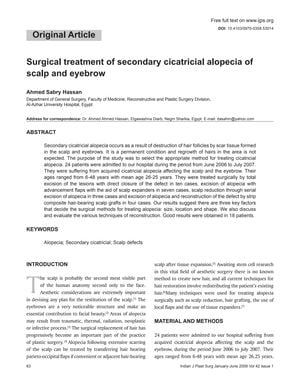Surgical Treatment of Secondary Cicatricial Alopecia of Scalp and Eyebrow
January 2009
in “
Indian Journal of Plastic Surgery
”

TLDR Surgery for scar-related hair loss on the scalp and eyebrow was successful in 75% of patients.
In a study from June 2006 to July 2007, 24 patients aged 6 to 48 years with acquired cicatricial alopecia from burns, trauma, or infection were treated with surgical methods tailored to their condition's specifics. Treatments included total excision with direct closure (10 cases), advancement flaps with scalp expanders (7 cases), serial excision (3 cases), and strip composite grafts (4 cases). The success rate was 75%, with good results in 18 patients. The study highlighted that scalp tissue is the best replacement for itself and that surgical approaches must be individualized. Complications such as expander exposure, implant failure, infection, and partial graft take were noted, underscoring the need for meticulous planning in tissue expansion procedures.





